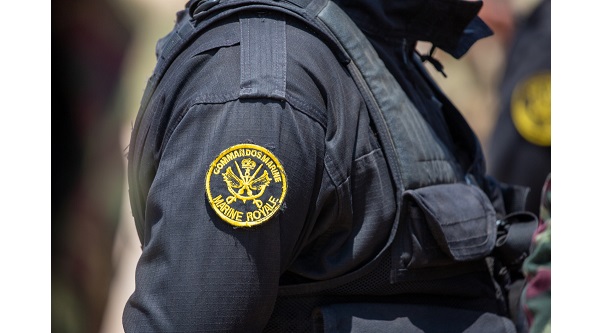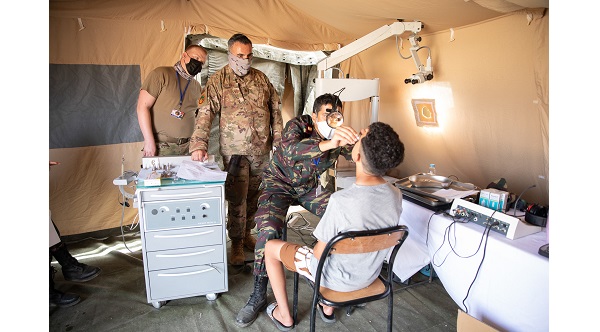
African Lion is U.S. Africa Command’s largest annual exercise. This year’s event was hosted by Morocco, Tunisia, and Senegal from June 7-18, 2021. More than 7,000 participants from nine nations trained together with a focus on enhancing readiness for U.S. and partner nation forces. African Lion 2021 is multi-domain, multi-component, and multinational exercise, which employs a full array of mission capabilities with the goal to strengthen interoperability among participants.
In addition to the participating nations contributing troops and units, 20 nations sent international observers to the exercise. The training events included humanitarian assistance, command and control, air operations, medical readiness, maritime, and joint forcible entry. For the U.S. units African Lion 2021 provided an opportunity to mobilize, deploy, conduct operations, and then redeploy.
History of African Lion. The exercise was first conducted in 2002 – with the participation of the U.S. Marines and Royal Moroccan Armed Forces. U.S. Africa Command increased its involvement in the exercise with the inclusion of the U.S. Army Southern European Task Force, Africa based in Vicenza, Italy. African Lion 2021 is the 17th iteration of the exercise. SETF-A assumed lead responsibility of exercise African Lion in 2019 from the U.S. Marine Corps. The exercise is an annual event but was cancelled in 2020 due to the COVID-19 pandemic.
A Big Exercise for a Big Continent. African Lion 2021 incorporated units and equipment from a variety of countries and services. Africa is a huge continent with a population that is expected to exceed two billion in three more decades. In this new era of ‘great power competition’ Africa has emerged as a zone of competition for the United States, Russia, and China. In addition, violent extremist groups such as the Islamic State, Al Qaeda, Boko Harem, and other affiliate jihadist organizations have been making headway in solidifying their hold on parts of Africa. Due to the current tension between Madrid and Rabat over the Morocco claims on the Western Sahara Spain decided not to participate in the African Lion 2021 exercise.
Scope of the Exercise. Some of the principal United States players included Africa Command and the U.S. Army Southern European Task Force – Africa. General Stephen Townsend commands AFRICOM and Maj. Gen. Andrew Rohling commands SETF-A. The Joint Chiefs of Staff-sponsored exercise was scheduled and supported by AFRICOM. SETF-A established the exercise’s combined joint task force headquarters. It integrated U.S. Africa Command components and international partners. Almost 4,000 U.S. service members took part alongside other international forces.
Participating Nations. African nations taking part in the exercise included Morocco, Senegal, and Tunisia. British paratroopers from the 16th Air Assault Brigade based in Colchester, United Kingdom (and an element of the U.S. 173rd Airborne Brigade) conducted a joint forcible entry airborne assault onto a drop zone in Grier Labouie, Morocco. Other NATO nations took part as well to include Morocco, Tunisia, Senegal, Brazil, Canada, Netherlands, Italy, and others. Multinational observers came from the African Union, Chad, Denmark, Djibouti, Egypt, Gabon, Ghana, Ivory Coast, Jordan, Kenya, Malta, Niger, Nigeria, Norway, Poland, Qatar, and the UAE.
Participating US Units. US naval, air, and ground forces took part in this exercise. A US naval contingent conducted maneuvers that included a naval gunfire exercise and multiple sea-based operations involving U.S. and Moroccan vessels. The various U.S. ground units conducted a variety of events including command post exercises and small unit tactical training.

Photo: Moroccan Special Forces alongside U.S. Army Special Forces Soldiers assigned to the 19th Special Forces Group (Airborne), Utah Army National Guard fast rope from a MH-47 Chinook of the 160th Special Operations Aviation Regiment onto a rooftop and clear a building during a high value target training exercise at Tifnit, Morocco on June 17, 2021. (Photo by Sgt. James Garvin, 79th Theater Sustainment Command)
Air Operations. There were about 46 supporting aircraft, to include 21 mission aircraft. U.S. air units included F-16 Fighting Falcons, C-130J Super Hercules, MH-47 Chinooks, and KC-135 Stratotanker aircraft. The Moroccan Air Force took part in the air maneuvers as well. The U.S. Air Mobility Command deployed two airfield survey teams from the 621st Contingency Response Wing during April 2021 to conduct airfield surveys in preparation for the exercise. The F-16s conducted Agile Combat Employment (ACE) events during the exercise working alongside Moroccan fighters. C-130Js provided critical support by transporting weapons, support equipment, and essential personnel to and around the exercise region. In addition the propeller-driven transports conducted airdrops, airlift, and aeromedical evacuation operations. The KC-135s provided aerial refueling for the combined fighter operations throughout the exercise – to include the Moroccan fighters. MH-47s from the 160th SOAR conducted operations to include fast roping SOF operators onto complexes with high value targets. USAF Joint Terminal Attack Control (JTACs) Airmen supported the air operations and worked with their Moroccan counterparts.

Photo: Royal Moroccan Navy Commando. (Photo by Sgt. Jacob Jesperson, U.S. Army, June 14, 2021).
SOF Participants. A number of special operations forces units took part in the exercise including 19th Special Forces Group, 160th Special Operations Aviation Regiment, Royal Moroccan Army paratroopers, and Royal Navy Commandos. The exercise strengthens the interoperability among SOF participants.
Georgia National Guard. The Georgia National Guard played a big role in this years exercise. More than 700 soldiers from the Georgian Army National Guard were present for the exercise – primarily from the 648th Maneuver Enhancement Brigade and the 48th IBCT. The Georgians contributed an infantry and artillery battalion. In total, Georgia sent over 100 vehicles and nine M109A6 Paladin howitzers. They conducted situational training exercise lanes, field training exercises, indirect fire gunnery table qualification, and participated in a combined and joint live-fire exercise.

Photo: U.S. Army Special Forces Soldiers assigned to 19th Special Forces Group, Utah Army National Guard conduct combined training with Royal Moroccan Army Soldiers during African Lion 2021 in Tifnit, Morocco June 8, 2021. (Photo courtesy of Southern European Task Force Africa)
Utah National Guard and SPP. Utah maintains relations with Morocco through the State Partnership Program (SPP). In 2004, the United States designated Morocco as major non-NATO ally. The Utah National Guard contingent included members of the 19th Special Forces Group and Air National Guard unit members. The Utah guardsmen were training in and around the Moroccan cities of Tifnit, Tantan, and Tafraoute. Through the SPP members of the National Guard can maintain relationships with partner country officials and military members for decades. This helps build long-term alliances that can respond to future challenges. Tunisia and Senegal are also SPP nations. There are 15 African nations in the SPP.
19th SFG. An element of the 19th Special Forces Group, Utah National Guard participated in the training event. Alongside special operations counterparts from other nations they conducted training activities to include airborne operations, fast roping, range firing, and tactical exercises.

Photo: A member of the 19th Special Forces Group conducts a Jumpmaster Personnel Inspection (JMPI) of a paratrooper in preparation for an Airborne Operation in Ben Guerir Airbase, Morocco, on June 10, 2021. (U.S. Army photo by SPC. Brendan Nunez)
Humanitarian Operations. Several different services were provided to Moroccan civilians including general medicine, dental, and optometry. Utah’s 151st Expeditionary Medical Group conducted medical training with Moroccan medical professionals as well as providing health services to local citizens. A temporary field hospital was set up to provide the services and conduct the humanitarian civic assistance (HCA). The hospital provided general medical care, level 2 surgical and dental care, as well as other medical specialties.

Photo: Members of the Utah Air National Guard provided medical care to patients at a surgical field hospital during African Lion 2021. (Photo by Colton Elliott June 7, 2021)
COVID Precautions. Most U.S. military exercises were cancelled or significantly downsized during 2020. This included the cancellation of African Lion 2020. This year U.S. service members were pre-screened and tested prior to deployment. Some units conduced a two-week self-quarantine as well. Once deployed to the exercise region many units conducted another COVID-19 test for their personnel. In addition, many member who deployed were vaccinated for COVID-19. Standard safety measures were employed where feasible to include physical distancing, face coverings, and much handwashing.
The African Lion 2021 exercise provided the opportunity for nations to employ a full array of mission capabilities that will strengthen interoperability among partner nations and enhance the ability of US and other partner nation forces to operate in the African theater of operations. The exercise also provided an example of the United States’ long-term commitment to Africa and the strategic importance of the continent to the United States.
**********
African Lion 2021 – Culminating Video. A quick video that highlights some of the training activities of the exercise. Video by Sgt. James Garvin, Southern European Task Force Africa, June 18, 2021, 2 minutes.
https://www.dvidshub.net/video/803004/african-lion-2021-culminating-video
African Lion 21 Wrap Up Video. U.S. Army soldiers explain their role in the exercise and the importance of the exercise. Video by Sgt. Jeron Walker, Georgia National Guard, June 28, 2021, 3 minutes.
https://www.dvidshub.net/video/805193/african-lion-21-wrap-up-video